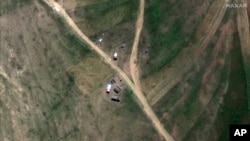Eritrea has fought alongside Ethiopia against Tigray forces. It rejects allegations that its soldiers committed some of the worst atrocities in the conflict that began in late 2020.
Maxar Technologies' satellite data shows combat tanks, self-propelled howitzers and an M-46 field artillery battery in the Eritrean town of Serha on September 19. The town is located over the border from Zalambessa, a Tigray town that was one of the first to be overrun by the conflict.
Other satellite imagery captured on Monday and shared by Maxar shows military mobilization in the Tigray town of Sheraro, which a humanitarian worker this month described to the AP as being targeted by deadly shelling that caused tens of thousands of people to flee. The worker, like others, spoke on condition of anonymity for fear of retaliation.
Last week, Tigray forces accused Eritrea of launching a full-scale offensive along the border in what appeared to be an escalation of fighting that renewed in August after months of relative calm.
Witnesses in Eritrea this month told The Associated Press that people including students and public servants are being rounded up across the nation and sent to fight in the new offensive.
The U.S. envoy to the Horn of Africa, who has been pressing the Ethiopian and Tigray sides to stop fighting and hold peace talks, told reporters last week that Washington has been tracking Eritrean troop movements across the border.
“They are extremely concerning, and we condemn it,” Mike Hammer said. “All external foreign actors should respect Ethiopia’s territorial integrity and avoid fueling the conflict.”
Eritrean President Isaias Afwerki, the only leader the country has had since independence three decades ago, remains a foe of the Tigray authorities despite Ethiopia and Eritrea restoring ties in 2018 following a bloody border war.
Tigray authorities have bristled at the suggestion made by an African Union special envoy that Eritrea be part of talks to end the current conflict.
The war in Tigray is estimated to have killed tens of thousands of people and left millions in the region without basic services like phone, electricity and banking for well over a year.
Independent journalists and human rights researchers are barred from the region.







